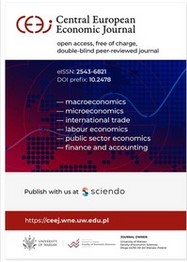Economic impact of the EU Eastern enlargement on New Member States revisited: The role of economic institutions
Economic impact of the EU Eastern enlargement on New Member States revisited: The role of economic institutions
Author(s): Jan Hagemejer, Jan Jakub Michałek, Pavel SvatkoSubject(s): Supranational / Global Economy, Evaluation research, Transformation Period (1990 - 2010), EU-Approach / EU-Accession / EU-Development
Published by: Wydawnictwa Uniwersytetu Warszawskiego
Keywords: EU enlargement; New Member States; synthetic control method;
Summary/Abstract: The paper analyses the economic implications of the accession of New Member States (NMS) to the European Union (EU) in 2004 and 2007. The estimation effects of integration with the EU were carried out as a comparative case study using the synthetic control method (SCM) proposed by Abadie and Gardeazabal. Compared to previous studies analysing the effects of accession to the EU (Campos, Coricelli and Moretti), we check for the importance of the quality of economic institutions for the matching process of the analysed economies with their comparators. The results of the econometric analysis show a positive impact on the country performance 6 years and 12 years after accession to the EU. The gains from accession are large but not universal. For 5 of the 10 analysed countries the difference in levels of per capita gross domestic product (GDP) against the counterfactual is at least 30%.
Journal: Central European Economic Journal
- Issue Year: 8/2021
- Issue No: 55
- Page Range: 126-143
- Page Count: 18
- Language: English

